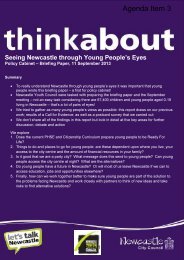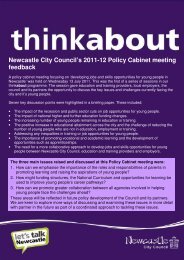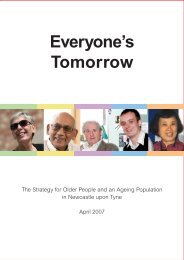NEWCASTLE'S MUSICAL HERITAGE AN INTRODUCTION By ...
NEWCASTLE'S MUSICAL HERITAGE AN INTRODUCTION By ...
NEWCASTLE'S MUSICAL HERITAGE AN INTRODUCTION By ...
You also want an ePaper? Increase the reach of your titles
YUMPU automatically turns print PDFs into web optimized ePapers that Google loves.
Of all the celebrities to appear in Newcastle during this Golden Age, none of<br />
the names quite conjures up the magic as that of the world famous Italian tenor,<br />
Enrico Caruso, who, on 10 th September 1909 came to Newcastle and sang<br />
before an audience in the Town Hall. Caruso was no stranger to England; he<br />
maintained a flat in Maida Vale in London, which he visited when he could to see<br />
his son who was being privately educated there. Although he had appeared in<br />
opera at Covent Garden he had never sung in the provinces and this was to be<br />
the one and only time brought about by circumstances rather than design. In<br />
1909 Caruso suffered throat trouble and cancelled the last part of his Met.<br />
Season in New York to receive treatment. Following the operation on his throat<br />
he tested his voice at a couple of concerts at the Kursaal in Ostende. As these<br />
concerts went well he decided to test his voice further in the English provinces<br />
taking the view that it was perhaps wiser to face the audience and critics of<br />
Newcastle and other provincial towns before facing those of London. He decided<br />
to break his voice in gently and sing three numbers only on each programme.<br />
According to the programme he was to sing ‘Celeste Aida’ (from Aida by Verdi),<br />
‘O Paradiso’ (from L’Africaine by Meyerbeer) and the duet ‘Solenne in quest’ ora’<br />
(from Don Carlos by Verdi) with Sig. Lacomte, baritone, but on the night Caruso<br />
lived up to his generous reputation and gave the audience what they wanted to<br />
hear. Let the Journal for Saturday 11 th September 1909 take up the story; -<br />
‘Although Newcastle did not follow the example of Glasgow and other large<br />
towns by crowding the Town Hall to overflowing last night, when Sig. Caruso<br />
appeared for the first time in the city, it was nevertheless a large audience that<br />
welcomed this distinguished tenor, and their enthusiasm was something to be<br />
long remembered. What blank spaces there were, were due, no doubt, not to any<br />
lack of desire to make acquaintance with the singer but rather to inability or<br />
determination not to pay the price – the heavy price which the possession of a<br />
seat required. Last nights concert proved that Caruso is just as fortunate in his<br />
voice as he is in those clever people associated with him, who help to keep his<br />
name before the public and that is saying a great deal. No artist, perhaps, has<br />
been “boomed” to the same extent as this one, and those who had the pleasure<br />
of hearing him last night will agree that it is difficult to recall one who more<br />
thoroughly deserves the many kind things that have been said of him. In other<br />
words great expectations were more than realised.<br />
It is no reflection on the famous tenor’s artistic colleagues to say that Caruso<br />
was first and the rest nowhere’<br />
The review goes on to list the programme Caruso sang, which in addition to<br />
the three arias scheduled, included the songs, ‘Ideale’, ‘Euand io ti Guardo’ and<br />
Pour un Baiser’ by Tosti, ‘Musica Proibita’ by Gustaldon, and ‘Lento Chat t’Amo’<br />
by Latuo. As a final encore he sang – what else – but ‘Vest la Giubba’ (On with<br />
the Motley) from I Pagliacci by Leoncavallo.<br />
78

















